Republican
Sen. John McCain is requesting review of the recently publicized “stand your ground” law in the state of Arizona. Following an outpouring amount of controversy over the acquittal of George Zimmerman in the Trayvon Martin case, McCain is requesting action from Arizona state officials by asking them to reconsider the rules and regulations of the law. The Huffington Post reports:
Sen. John McCain (R-Ariz.) said on Sunday that while he does not question the decision of the jury in the Trayvon Martin case, he does think all states, including his own, should review their "stand your ground" laws.
Read more here.
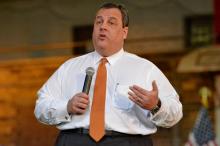
As activists push states to recognize gay marriages, New Jersey Gov. Chris Christie — conservative Republican governor in a blue state and a 2016 presidential possibility — is walking a fine line between two electorates and two elections.
Christie vetoed same-sex marriage legislation last year and severely criticized the Supreme Court’s decision striking down a ban on federal rights for same-sex married couples. At the same time, he is “adamant” that same-sex couples deserve equal legal protection, wants a referendum on gay marriage, and vows to abide by a same-sex marriage law if New Jersey voters approve it.
He’s tiptoeing between constituencies. First are the voters of New Jersey: polls show they favor same-sex marriage, and Christie wants them to re-elect him in November by a big margin.
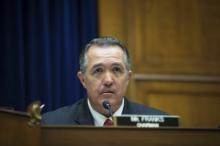
As the House debates a bill to limit abortion, Republicans are reopening a subject that cost them dearly in 2012 and continues to present perils for the party’s attempt to appeal to women voters.
Even before the full House took up the bill Tuesday to ban abortion after 20 weeks of pregnancy, Republicans had a sharp reminder of how sensitive the issue can be when Rep. Trent Franks, R-Ariz., appeared to say that rape rarely results in pregnancy.
“The incidence of rape resulting in pregnancy [is] very low,” Franks said at a June 12 committee hearing on the bill. Franks later said he meant that third-trimester abortions of pregnancies caused by rape are rare.
Republican's recently hired its former South Carolina chairman to lead engagement with evangelicals, even though 79 percent of evangelicals voted for Republican nominee Mitt Romney in 2012. The Washington Post lists four reasons why the GOP is continuning to reach out to evangelicals.
1. They need to - A lot of the faith community did not vote in the last election. This hurt the Republican party because 65 percent of evangelical voters identified with or leaned toward the Republican Party in 2008.
2. Mending fences - Republicans will have to communicate to the religious community a bit differently as the culture changes around hot button issues like same sex marriage and immigration.
3. New alliances - Republicans must unite economic conservatives, pro-defense hawks, anti-Washington libertarians and religious (mostly evangelical) conservatives to win elections.
4. Competition from Democrats - Democrats have put more effort into their faith outreach in the last two elections.
Read more here.

With the Statue of Liberty as a backdrop, the “Nuns on the Bus” on Wednesday kicked off a national tour for immigration reform aimed at giving a faith-based push to legislation that’s now hanging in the balance in Congress.
“We have got to make this an urgent message of now,” Sister Simone Campbell, head of the social justice lobby Network, which organized the tour, told a rally on the New Jersey side of the Hudson River.
“The next six to eight weeks is going to determine what we can accomplish,” Campbell said as she pointed to nearby Ellis Island, the American gateway for generations of immigrants. “The time is now for immigration reform.”
Champions of immigration reform believe they have their best opportunity to pass a comprehensive overhaul since 2007, when an effort backed by President George W. Bush was thwarted by members of his own party. After Republicans lost the Latino vote in last fall’s elections, GOP leaders said they would be open to an immigration bill that they think could help change that political dynamic.
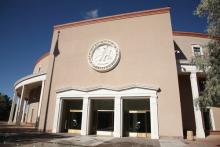
A New Mexico lawmaker has drawn fire for proposing legislation to classify an abortion after a sexual assault as “tampering with evidence.”
Critics pounced on House Bill 206, introduced Wednesday by Republican state Rep. Cathrynn N. Brown, saying victims of sexual assault could be charged with a felony if they sought an abortion after rape or incest. But Brown said Thursday that the legislation was aimed at attackers, not victims.
“House Bill 206 was never intended to punish or criminalize rape victims,” Brown said in a statement. “Its intent is solely to deter rape and cases of incest. The rapist — not the victim — would be charged with tampering of evidence.”
“New Mexico needs to strengthen its laws to deter sex offenders,” the statement added. “By adding this law in New Mexico, we can help to protect women across our state.”
Brown said she would amend her legislation to make the intent clearer, the Albuquerque Journal reported.

A number of Roman Catholic bishops are making forceful last-minute appeals to their flock to vote on Election Day, and their exhortations are increasingly sounding like calls to support Republican challenger Mitt Romney over President Barack Obama.
The most recent example: a letter from Illinois Bishop Daniel Jenky accusing the administration of an unprecedented “assault upon our religious freedom” and implying that Catholics who pull the lever for Democrats who support abortion rights are like those who condemned Jesus to death.
“Since the foundation of the American Republic and the adoption of the Bill of Rights, I do not think there has ever been a time more threatening to our religious liberty than the present,” Jenky writes in the letter, which he ordered priests in his Peoria diocese to read at all Masses on Sunday.
In the letter, Jenky blames Obama and the Democratic majority in the Senate for trampling on the Catholic Church’s rights and moral convictions by requiring health insurers to provide contraception coverage. Jenky also compares abortion rights supporters to the Jewish crowd in Jerusalem that pledged loyalty to the Roman Empire and demanded that Pontius Pilate crucify Jesus.
“For those who hope for salvation, no political loyalty can ever take precedence over loyalty to the Lord Jesus Christ and to his Gospel of Life,” Jenky writes.

It’s always annoyed me when people assume that, because I’m a Christian, I must also be socially conservative on all requisite issues. And while I understand those who lean further right because of their Christian beliefs, I take issue with those who suggest that being both a follower of Christ and a social progressive are mutually exclusive.
In fact, most of my positions on social issues can be traced back to my faith, which goes to show that the spectrum of beliefs taken from any given faith, as well as the many ways in which those beliefs are applied, is wide and arguably still growing as we continue to become increasingly pluralistic and intertwined.
Depending on your perspective, it could be argued that the landscape of presidential candidates either reflects such religious diversity, or that it’s still more of the same old majority rule at play, with a few minor cosmetic adjustments. For some, the fact that a Mormon is the Republican nominee is nothing short of astonishing, and what’s more, that the evangelical right is generally finding their way toward alignment with Mitt Romney’s presidential ticket.
It’s also worth noting that last week's vice presidential debate was the first time in history that we’ve had two Catholic VP nominees running against each other. The only fairly typical one in the group (unless you ask the Muslim conspiracy theorists, that is) is Barack Obama who is a member of the mainline protestant Christian denomination, the United Church of Christ.
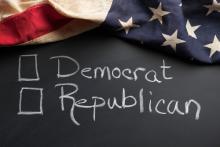
With the Republican and Democratic National Conventions having taken place over the last two weeks, we can officially say that we’re entering the election season (i.e., that time when the general public begins to pay attention).
A couple of friends who pastor churches in non-D.C. parts of the country asked me if we feel the need to address politics at The District Church, being in the very belly of the beast (my words, not theirs). Specifically, they were asking: Given the intense polarization and often-unproductive arguing that we see around us, even in the church, about the need to address how we interact with those who disagree with us.
So far, we haven’t needed to. In our church community, we have Republicans, Democrats, Independents, and yes, even people who don’t care about politics; we have Hill staffers, White House staffers, activists, advocates, lobbyists, policy wonks, and more — and we’ve all come together as the body of Christ, recognizing that our allegiance is first to Jesus before any party or even country.
Even so, every four years (or every two, if you pay attention to mid-terms; or all the time, if you’re even more politically engaged), posts about politics pop up with increasing frequency on social media, eliciting often-furious back-and-forths that usually end up doing nothing more than reminding each side how right they are and how stupid the other side is.
So I figured I’d try to offer a few suggestions on how we can engage with one another on matters of politics in healthy ways.

Their issues are predominantly liberal and their constituency strongly leans Democratic, but a leading secularist group hopes a high-rolling Republican lobbyist is just who they need to open doors on Capitol Hill.
The Secular Coalition for America on Thursday (May 3) hired Edwina Rogers, who has worked for two Republican presidents and four Republican senators, as its new executive director. The SCA has 11 member groups -- many of them officially at odds with Republican politicians and policies -- including American Atheists and the American Humanist Association.

It seems lately that the Republican party is painting itself into an angry corner that it can’t find its way out of.
Rush Limbaugh’s recent loose-lipped “slut” comment is a clarion call to his significant conservative base to forge ahead in a direction that leads nowhere good. Basically, he cast negative, sexually charged aspersions at Sandra Fluke, a college student who publicly advocated for health insurance that included birth control.
As this piece in the Christian Science Monitor notes, his comments — and the greater sentiment they reflect — point to a sexual double-standard among many social conservatives. But that isn’t what is tripping up the GOP right now.
Anger is their Achilles heel.

Since the rule of Constantine in the 4th century A.D., church leaders have lived precariously close to showing preference and promoting one political leader over another. The Rev. Billy Graham came to regret his close ties to Richard Nixon, who used "America's Pastor" to his political advantage.
A prophetic distance must be maintained, allowing space between what the Spirit and the Word might say in any given situation, and the political leader or policy in question. The role of prophetic analysis requires distance so as to avoid compromise.
Then, too, we see how important it is not to make our rendition of the Gospel synonymous with a particular view of economics, role of government, social management or civic engagement. After watching Christian leaders running to the beck and call of Nixon, Chuck Colson warned us that the kingdom of Christ does not arrive on Air Force One.

As someone who self-identifies as an evangelical Christian, often I begin to feel like the subject of a Discovery Channel documentary, particularly in the midst of a heated presidential election cycle.
It’s Evangelical Week here on Discovery! Travel with us as our explorers track the elusive evangelical in its native habitats. Watch as evangelicals worship, work and play, all captured on film with the latest high definition technology. And follow our intrepid documentary team members as they bravely venture into the most dangerous of exotic evangelical locations — the voting booth!
I understand the interest in us evangelicals, I really do. The way much of the mainstream media covers our communities in the news can make us seem like a puzzling subspecies of the American population, not unlike the Rocky Mountain long-haired yeti.
Are we really that difficult to comprehend?
In a word, yes.
At a town hall meeting in New Hampshire, at least two members of the audience challenged Mitt Romney on the morality of America’s economic system and of the trickle-down theory of economics. Romney defended the concept that corporations are people and asked which country in the world has higher incomes than the United States.
Luxembourg.
And depending upon what measure one uses and which web site on consults, that list also includes the territory of Bermuda, the dependency of Jersey, Equatorial Guinea, United Arab Emirates, Norway and Switzerland.
It is true that the United States has the most powerful economy measured by Gross Domestic Product — nearly $15 trillion. China is number two with $10 trillion. But if we measure per capita income, the United States falls to number three behind Norway and Switzerland. (Norway: $43,400 Switzerland: $40, 680 U.S. $37,870)
According to the web site WiseGeek, Luxembourg has the highest income per capita in the world.
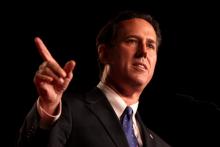
Republican presidential contender Rick Santorum is a darling of the Christian right, and made a tremendous showing among evangelicals in the Iowa caucuses. But Santorum himself is a Catholic, and while many of his more socially conservative positions have endeared him to the evangelical community, they actually conflict with the teachings of his own church. The theological tensions in Santorum's record pose potential political problems for his candidacy: Can he bring Catholics into his camp despite advocating unorthodox positions? And can he maintain his reputation among conservative Christians as a principled man of religious integrity, despite taking political stances that violate the teachings of his own faith?
Santorum has often defended the role of religion in political affairs, stating that his own faith was a significant factor in his Senate career.
"The social teachings of my faith were a factor in my work as a senator," Santorum wrote in a 2007 opinion piece for the Philadelphia Enquirer, explaining his votes in favor of global AIDS relief as rooted in Christian teachings to "care for the poor."
But on two issues in particular, Santorum has broken with official Catholic doctrine to side with hardline evangelicals against accepted scientific conclusions. On several other matters, Santorum's political positions have sparked ire among Catholics concerned with social justice.

“Evangelical voters” have now been sized and squeezed into a homogeneous political block. These folks have views on the political right wing, trust in robust American military might, believe that wealth is a blessing to be protected by tax policy, want society to be inhospitable toward gays, oppose any form of abortion, feel that “big” government is always malevolent, and assert that American individualism is the divinely sanctioned cornerstone of the Republic. Apply the label “evangelical” to a voter and you can expect these political responses.
The problem is that it’s simply inaccurate. One size doesn’t fit all when in come to evangelicals. It distorts reality. But that’s just too inconvenient for pundits intent on predicting how various blocks will vote.
Self-identifying as an Evangelical might get me labeled a political activist. Yes, I’m an Evangelical. I’m also a Republican. But touching these two labels together invokes pictures of voting checklist guides, culture wars, and the case of Visine needed to make Michelle Bachmann eyes blink. I‘m not a militant, taking the country back for God.
So am I an Evangelical? Did you know that the family name is actually Swiss-German? That explains our passive-aggressive nature.
The term "Evangelical" is like a pair of hand-me-down underwear. It's been stretched over so many shapes and sizes that it's lost its snap and doesn't fit anyone anymore. It’s been pulled around the circumference of Mars Hill, Seattle and Mars Hill, Grand Rapids. Billy Graham, Ted Haggard, Jim Bakker, Jay Bakker Benny Hinn, Scot McKnight, Don Miller, Jimmy Carter, W., John Piper, Ken Ham, Jim Wallis, and Bill Hybels have all had their turn sporting this hand-me-down garment.
Ask me if I’m an Evangelical and I’ll ask if you know where that label’s been. It’s rubbed against far too much junk for my taste.
Words lose their currency with overuse, it’s true. But it’s also true that a large part of my issue with being labeled an Evangelical is vanity.
But to say that kids in poor neighborhoods have “no habits of working” and have “nobody around them who works” is false and trivializes all of the hardships that poor people in this country face.
Three-quarters of those who live under the poverty line have jobs. Many more are looking for work.
I don’t doubt that you can find people out there who are poor because they don’t have a strong work ethic, but all you need to do is turn on E! or browse TMZ for a few minutes to find lazy rich people who take no responsibility for their actions.
Unfortunately, many people who go to church on Sunday are more influenced by what they see on cable TV than by the Bible. I hear that lament from pastors all the time. Too many of their congregant’s political priorities are determined by a party or ideology – not the Word of God. Their identities are shaped by marketing and media campaigns that manufacture a view of the world in order to maximize their own power and profit.
The antidote is simple. Christians need to read their Bibles more. It makes a difference.
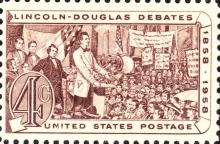
Governor Perry should have to stand up and have the three hour Lincoln-Douglas style debates about why he wants to cut the Departments of Education, Commerce, Energy, and perhaps even the Environmental Protection Agency, and all the other government work that he would like to forget.